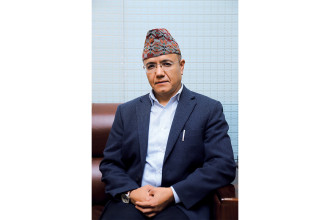Kiran Krishna Shrestha
Founder, Nepalaya
Kiran Krishna Shrestha established Nepa˜laya in 2005 and with the success of their first book - Narayan Wagle's ‘Palpasa Café’ – there has been no looking back. Later they also diversified into managing big events, and are working with different artistes organizing large scale shows in Nepal and overseas. Their work with managing the famed Nepali folk rock band, Nepathya is a testament to their creative and strategic abilities.
Nepalaya has over the years published and promoted a wide range of Nepali writers. On the occasion of its 20th anniversary, Nepalaya announced an open call for Nepali writers under 25 from around the world to submit their work. Launched under the motto '25 in 2025' they will publish three books by Nepali youth aged 25 or younger from around the world this year under genres of short stories, poetry, and essays.
Nepalaya also hosts a regular micro event series called Paleti that offers space to music artists old and new to perform to an audience of music lovers. They have consistently shaped conversations around literature, music, poetry while promoting creative and sustained line up of events that are meaningful. Adding to the valleys vibrant landscape, they are soon launching a space that will host literary and musical events, have a coffee shop and a book store.
Kiran Krishan Shrestha as the team leader does not simply stand at the helm of the operations but is a strong collaborator who shares the responsibility and the laurels with his team, with a strong and determined focus on doing the right thing.
In this edition of Business 360, Shrestha shares his views on leadership.
Is leadership inherent or built?
Even if someone is born with leadership qualities but does not brush up on it, their skills become outdated. Some people have the right personality traits for leadership. However, a leader needs to be compatible with the goals of their organisation to be effective. Leadership is about being able to build a team; to co-work, to collaborate and to pave a path to the company’s objectives with team members. It is not about yourself; it is the ability to create a team that has confidence in themselves.
What does your leadership instil in the ethos of Nepalaya?
Whatever we do, we do in the spirit of collaboration. When we deal with the artist and their audience, we prevent any product from being overruled by one person’s whimsical decisions. I might come up with an idea that I may share with my team. Since everyone in our team has veto power, if, let’s say, one person in the editorial team says the idea will not work we will follow up on that. Through conversation either I convince them, or I get convinced. That is the way it works. The challenge is when someone wants to do something their way without convincing the other party. There are times when decisions feel instinctive but oftentimes decisions are a collaborative effort. The applause and the criticism both belong to the group.
As team leader, what is on your mind as you set up for Nepathya’s events?
We need production value. These days we are focused on audiovisuals; that is my area of interest. I find concerts to be akin to flights – we have to take off, cruise for some time, get through turbulence, switch to autopilot, and then land. There is methodology, a checklist, and the team. I have been to a lot of shows where the audience is taken for a ride by the production team. On the production end, I give liberty to the sound and light engineer. Once they know the idea that idea becomes theirs. The challenge is to make them feel like it is their show, make them own the show; to feel its value. They have to gauge the audience’s perspective. That is our value system at Nepalaya. When we account for these things, it becomes easier. Once the show is set up, my work is to sit back and enjoy the show with the crew. Once the show starts, my work is over.
How does Nepa-laya consistently deliver optimal results?
The world is all about collaborating and co-creating. The smarter way to achieve is to collaborate with someone who has more knowledge than I. The team at Thuprai approached me. They are Nepathya fans and they offered to make an app for the band. Back then, we had not started digitisation, nor did we know about monetisation. After they started digitising our platforms Nepathya’s music became available in all digital platforms – from Apple Music to Google Play. We know what we are doing and we appreciate what creative and technical people do. That is why we do not intervene in the process until we are asked to, as peer reviewers.
What trends are you setting in the event management space?
We are not professional event managers; we only do events for Nepathya. Promoting for them is easier than ever in a world unbound by finite media. For 25 years, the challenge was to keep up with technological advances, and to satisfy the audience with technology of our time. When we wanted to introduce online ticketing, the idea was to collaborate with Ticketmaster. But Thuprai delivered a platform catered to us that accepts all forms payments in Nepal that Nepalis can use to buy tickets for their relatives in America, and vice versa. On our website, we have open calls for organisers who would like to host Nepathya by making a bid or showing interest. In Nepal and abroad, sponsors can connect with us directly without the need for mediators. They may think it is the organisers who must approach them for money but sponsors do realise that this is a collaboration that creates value for both parties. My question to them is, are you looking for a marketing opportunity or a branding opportunity? If the answer is marketing, this may not be the right investment. Branding, on the other hand, has long-term impact that adds value to their product. And we give our affiliates – charitable organisations – discounted tickets to raise funds. This website will help democratise the event organising business and we are not keeping this site to ourselves.
What trends are you setting in publishing?
Publishing started from Narayan Wagle’s Palpasa Café which is celebrating its 20th year milestone this year. Palpasa Café was translated to English and a reader from the Republic of Korea read and recommended this book for Koreans – they translated the book to Korean. Similarly, a reviewer may publish a review of our book in The New York Times. Overnight thousands of people may want to read the book and I will find I cannot ship a physical copy to them. We have put our books on Amazon and people can get a copy of our books through the print on demand service in a matter of days. We also built an e-book platform over a decade ago, but it failed. A digital platform needs a tech person at the helm because there are bugs that need an instant fix. Once again, we collaborated with the team at Thuprai five years ago to host e-books and select audiobooks on their app. Most publishers in Nepal now host their ebooks on Thuprai’s e-book portal. That is our approach, waiting to strike means missing out and when the time comes we cannot afford to lose.
What additional ventures are you leading?
We envisioned a hall where people can read books, watch movies and perform music. A café for people to meet – a convergence point for artists with a bookstore where our books are available. We are building this property. The music hall hosts Paleti where we work with artists of yesteryears. I remember working with Ambar Gurung who said Paleti is not something that people would understand, it is about how it makes the artists feel. Some say the market does not exist and try to blame the audience. But, with 50 members in the audience we create an experience for the artist and their fans. For coffee, we went to Himalayan Java. They saw value in collaboration with this concept and Nepalaya, and we built a place where authors can have a couple of coffees. For our bookstore, we went to Miller Shrestha, co-founder of Bookverse Nepal, who curates a collection of English and Nepali books because selling is an art and he is a third-generation book seller innovating in the art of book selling. Our collaboration is complementary.
Would you describe your leadership style as Rock and Roll, Hip-Hop, RnB, or Classical?
An orchestra. It is about harmony between sections and the conductor who does not show his face; his focus is on all the nitty gritties. You cannot play an extra note as members of the orchestra. You cannot say: today I want to do things my way. Every member needs to recognise the leader’s presence and monitor their cues. The person with the gong, though they may only have five notes throughout the show, has to stay focused to ensure the notes hit at the optimal time. No one’s role can be nullified because if the gong beats at the wrong time, the whole show is over.






